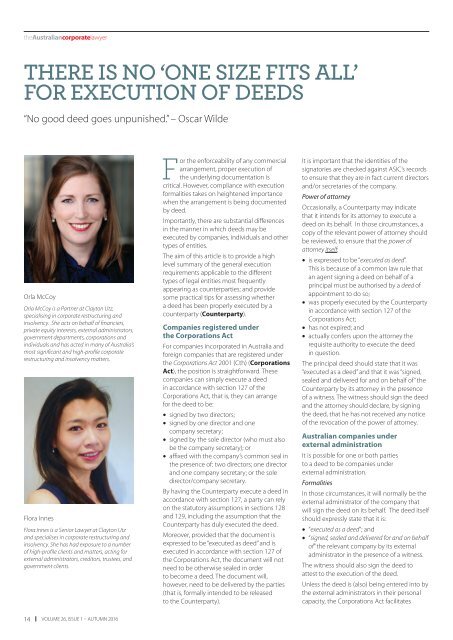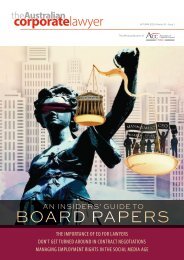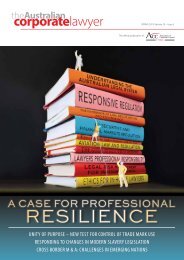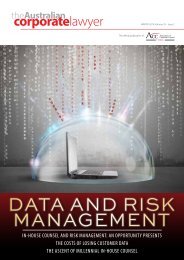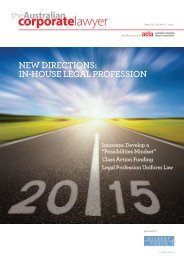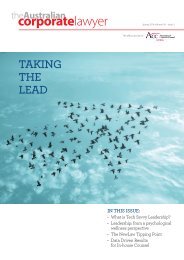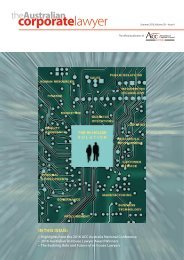Australian Corporate Lawyer - Autumn 2016
Australian Corporate Lawyer is the official publication of the Association of Corporate Counsel (ACC) Australia. The Autumn 2016 issue focuses on 'Advancing your in-House Career' and features a range of articles covering topics including: managing stress; trade marks and domain names; career motivated misconduct and cultural diversity.
Australian Corporate Lawyer is the official publication of the Association of Corporate Counsel (ACC) Australia. The Autumn 2016 issue focuses on 'Advancing your in-House Career' and features a range of articles covering topics including: managing stress; trade marks and domain names; career motivated misconduct and cultural diversity.
Create successful ePaper yourself
Turn your PDF publications into a flip-book with our unique Google optimized e-Paper software.
the<strong>Australian</strong>corporatelawyer<br />
THERE IS NO ‘ONE SIZE FITS ALL’<br />
FOR EXECUTION OF DEEDS<br />
“No good deed goes unpunished.” – Oscar Wilde<br />
Orla McCoy<br />
Orla McCoy is a Partner at Clayton Utz,<br />
specialising in corporate restructuring and<br />
insolvency. She acts on behalf of financiers,<br />
private equity interests, external administrators,<br />
government departments, corporations and<br />
individuals and has acted in many of Australia’s<br />
most significant and high-profile corporate<br />
restructuring and insolvency matters.<br />
Flora Innes<br />
Flora Innes is a Senior <strong>Lawyer</strong> at Clayton Utz<br />
and specialises in corporate restructuring and<br />
insolvency. She has had exposure to a number<br />
of high-profile clients and matters, acting for<br />
external administrators, creditors, trustees, and<br />
government clients.<br />
For the enforceability of any commercial<br />
arrangement, proper execution of<br />
the underlying documentation is<br />
critical. However, compliance with execution<br />
formalities takes on heightened importance<br />
when the arrangement is being documented<br />
by deed.<br />
Importantly, there are substantial differences<br />
in the manner in which deeds may be<br />
executed by companies, individuals and other<br />
types of entities.<br />
The aim of this article is to provide a high<br />
level summary of the general execution<br />
requirements applicable to the different<br />
types of legal entities most frequently<br />
appearing as counterparties; and provide<br />
some practical tips for assessing whether<br />
a deed has been properly executed by a<br />
counterparty (Counterparty).<br />
Companies registered under<br />
the Corporations Act<br />
For companies incorporated in Australia and<br />
foreign companies that are registered under<br />
the Corporations Act 2001 (Cth) (Corporations<br />
Act), the position is straightforward. These<br />
companies can simply execute a deed<br />
in accordance with section 127 of the<br />
Corporations Act, that is, they can arrange<br />
for the deed to be:<br />
• signed by two directors;<br />
• signed by one director and one<br />
company secretary;<br />
• signed by the sole director (who must also<br />
be the company secretary); or<br />
• affixed with the company’s common seal in<br />
the presence of: two directors; one director<br />
and one company secretary; or the sole<br />
director/company secretary.<br />
By having the Counterparty execute a deed in<br />
accordance with section 127, a party can rely<br />
on the statutory assumptions in sections 128<br />
and 129, including the assumption that the<br />
Counterparty has duly executed the deed.<br />
Moreover, provided that the document is<br />
expressed to be “executed as deed” and is<br />
executed in accordance with section 127 of<br />
the Corporations Act, the document will not<br />
need to be otherwise sealed in order<br />
to become a deed. The document will,<br />
however, need to be delivered by the parties<br />
(that is, formally intended to be released<br />
to the Counterparty).<br />
It is important that the identities of the<br />
signatories are checked against ASIC’s records<br />
to ensure that they are in fact current directors<br />
and/or secretaries of the company.<br />
Power of attorney<br />
Occasionally, a Counterparty may indicate<br />
that it intends for its attorney to execute a<br />
deed on its behalf. In those circumstances, a<br />
copy of the relevant power of attorney should<br />
be reviewed, to ensure that the power of<br />
attorney itself:<br />
• is expressed to be “executed as deed”.<br />
This is because of a common law rule that<br />
an agent signing a deed on behalf of a<br />
principal must be authorised by a deed of<br />
appointment to do so;<br />
• was properly executed by the Counterparty<br />
in accordance with section 127 of the<br />
Corporations Act;<br />
• has not expired; and<br />
• actually confers upon the attorney the<br />
requisite authority to execute the deed<br />
in question.<br />
The principal deed should state that it was<br />
“executed as a deed” and that it was “signed,<br />
sealed and delivered for and on behalf of” the<br />
Counterparty by its attorney in the presence<br />
of a witness. The witness should sign the deed<br />
and the attorney should declare, by signing<br />
the deed, that he has not received any notice<br />
of the revocation of the power of attorney.<br />
<strong>Australian</strong> companies under<br />
external administration<br />
It is possible for one or both parties<br />
to a deed to be companies under<br />
external administration.<br />
Formalities<br />
In those circumstances, it will normally be the<br />
external administrator of the company that<br />
will sign the deed on its behalf. The deed itself<br />
should expressly state that it is:<br />
• “executed as a deed”; and<br />
• “signed, sealed and delivered for and on behalf<br />
of” the relevant company by its external<br />
administrator in the presence of a witness.<br />
The witness should also sign the deed to<br />
attest to the execution of the deed.<br />
Unless the deed is (also) being entered into by<br />
the external administrators in their personal<br />
capacity, the Corporations Act facilitates<br />
14 VOLUME 26, ISSUE 1 – AUTUMN <strong>2016</strong>


